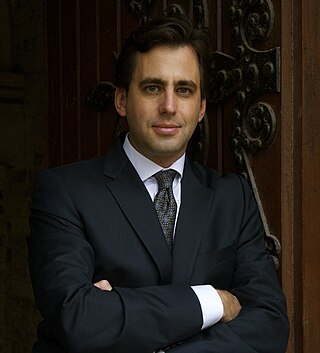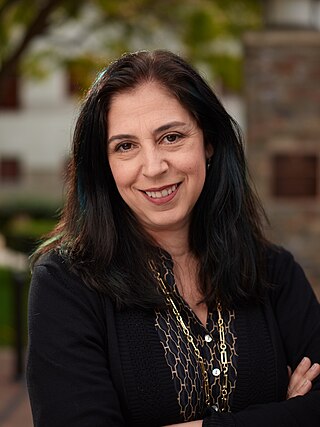Monarchianism is a doctrine that emphasizes God as one indivisible being, in direct contrast to Trinitarianism, which defines the Godhead as three coeternal, consubstantial, co-immanent, and equally divine hypostases.
The Apostolic Tradition is an early Christian treatise which belongs to the genre of the ancient Church Orders. It has been described to be of "incomparable importance as a source of information about church life and liturgy in the third century".

Richard John Bauckham is an English Anglican scholar in theology, historical theology and New Testament studies, specialising in New Testament Christology and the Gospel of John. He is a senior scholar at Ridley Hall, Cambridge.
Monotheism—the belief that there is only one deity—is the focus of the Abrahamic religions, which like-mindedly conceive God as the all-powerful and all-knowing deity from whom Abraham received a divine revelation, per these religions' traditions. The most prominent Abrahamic religions are Judaism, Christianity, and Islam. They, alongside Samaritanism, Druzism, the Baháʼí Faith, and Rastafari, all share a common core foundation in the form of worshipping Abraham's God, who is identified as Yahweh in Hebrew and called Allah in Arabic. Likewise, the Abrahamic religions share similar features distinguishing them from other categories of religions:
The term Abrahamic religion groups three of the major religions together due to their historical coexistence and competition; it refers to Abraham, a figure mentioned in the Hebrew Bible, the Christian Bible, and the Quran, and is used to show similarities between these religions and put them in contrast to Indian religions, Iranian religions, and the East Asian religions. Furthermore, some religions categorized as "Abrahamic" also share elements from other categories, such as Indian religions, or for example, Islam with Eastern religions.

The Church of the East or the East Syriac Church, also called the Church of Seleucia-Ctesiphon, the Babylonian Church or the Nestorian Church, is one of three major branches of Nicene Eastern Christianity that arose from the Christological controversies of the 5th and 6th centuries, alongside the Miaphisite churches and the Chalcedonian Church.

The Patristicum, officially the Augustinian Patristic Pontifical Institute, is a pontifical institute in Rome, under the supervision of the Order of Saint Augustine. It is an incorporated institute of the Pontifical Lateran University. It is responsible for the study of patristic theology, the history and theology of the Church Fathers.

The Church Fathers, Early Church Fathers, Christian Fathers, or Fathers of the Church were ancient and influential Christian theologians and writers who established the intellectual and doctrinal foundations of Christianity. The historical period in which they worked became known as the Patristic Era and spans approximately from the late 1st to mid-8th centuries, flourishing in particular during the 4th and 5th centuries, when Christianity was in the process of establishing itself as the state church of the Roman Empire.

Sidney H. Griffith is a professor of Early Christian Studies at the Catholic University of America. His main areas of interest are Arabic Christianity, Syriac monasticism, medieval Christian-Muslim encounters and ecumenical and interfaith dialogue.

Stephen James Blackwood is a Canadian-American professor, academic, and social commentator.
Manlio Simonetti was an Italian scholar of Patristics and the history of Biblical interpretation.
John Michael Rist is a British scholar of ancient philosophy, classics, and early Christian philosophy and theology, known mainly for his contributions to the history of metaphysics and ethics. He is the author of monographs on Plato, Aristotle, the Stoics, Epicurus, Plotinus, the dating of the Gospels, and Augustine. Rist is Professor of Classics Emeritus at the University of Toronto and part-time Visiting Professor at the Institutum Patristicum Augustinianum in Rome, held the Father Kurt Pritzl, O.P., Chair in Philosophy at the Catholic University of America in Washington, D.C., and is a life member of Clare Hall, Cambridge University. During his lengthy academic career he has been Regius Professor of Classics at the University of Aberdeen (1980-1983), Professor of Classics and Philosophy at the University of Toronto (1983–1996), and the Lady Davis Visiting Professor in Philosophy at the Hebrew University of Jerusalem (1995).

Alin Suciu is a Romanian coptologist and papyrologist. He is a Senior Researcher at the Göttingen Academy of Sciences and Humanities and a Docent in Early Christian Literature and Coptic Christianity at the Faculty of Theology, University of Helsinki.
Claudius Marius Victorius was a rhetor of the fifth century CE from Marseille. He is known for a Latin poem on Genesis in hexameters and a letter to the abbot Salomon against the moral degradation of his age.
Robert Darwin Crouse was a Canadian religious philosopher and Anglican priest.

Ilaria L. E. Ramelli is an Italian-born historian, academic author, and university professor who specializes in ancient, late antique, and early mediaeval philosophy and theology.

Aramaic studies are scientific studies of the Aramaic languages and literature. As a specific field within Semitic studies, Aramaic studies are closely related to similar disciplines, like Hebraic studies and Arabic studies.

The Evangelische Kirchenlexikon (EKL) is a theological lexicon published by Vandenhoeck & Ruprecht, Göttingen. The first edition appeared in three volumes from 1955–1959, and a register volume followed in 1961. The second edition was an unchanged reprint published in 1962. The editors were Heinz Brunotte and Otto Weber. Erwin Fahlbusch was responsible for the publication of the third, revised edition from 1986–1997 in collaboration with numerous specialist scholars.

Bart J. Koet was Professor of New Testament and Early Christian Literature at Tilburg University and the Dean of Research at the same institution. He was the president of the Centre for the Study of Early Christianity together with Bert Jan Lietaert Peerbolte of the Vrije Universiteit. He is since 2016 chairman of Studiosorum Novi Testamenti Conventus, the society of New Testament scholars of the Netherlands and Flanders. He is member of the Society of New Testament Studies.

Nicola Denzey Lewis is a Canadian academic of lived religion, early Christians, material culture of late antique Roman Empire, and women studies. She is a professor at Claremont Graduate University as the Margo L. Goldsmith Chair in Women's Studies in Religion.












